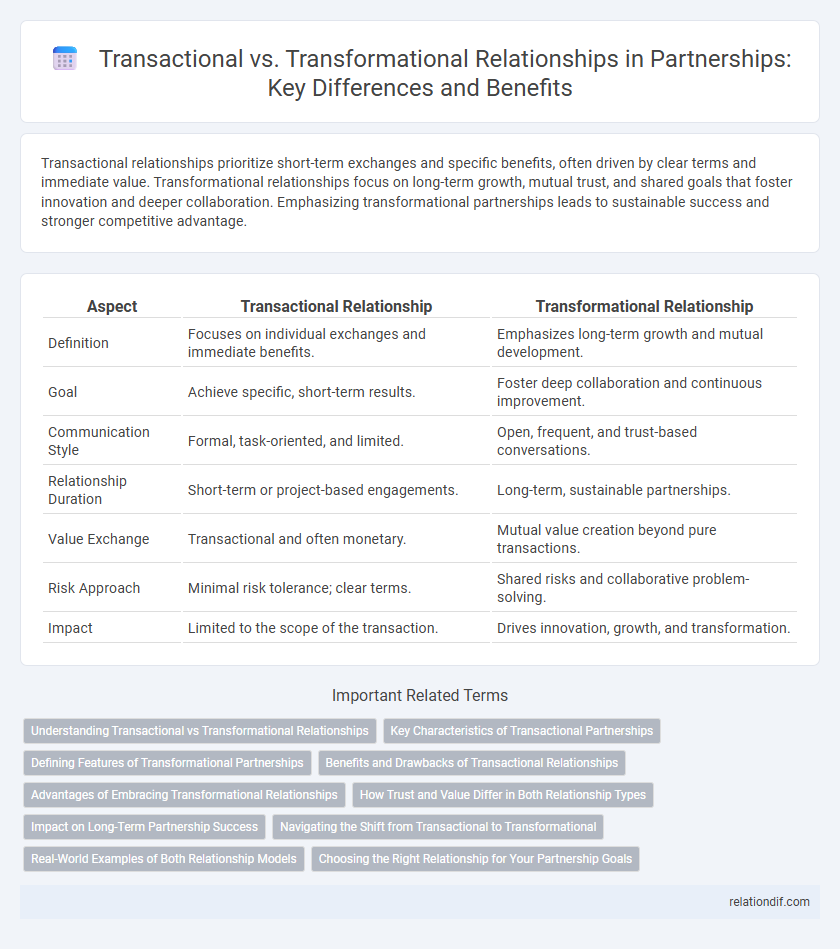Transactional relationships prioritize short-term exchanges and specific benefits, often driven by clear terms and immediate value. Transformational relationships focus on long-term growth, mutual trust, and shared goals that foster innovation and deeper collaboration. Emphasizing transformational partnerships leads to sustainable success and stronger competitive advantage.
Table of Comparison
| Aspect | Transactional Relationship | Transformational Relationship |
|---|---|---|
| Definition | Focuses on individual exchanges and immediate benefits. | Emphasizes long-term growth and mutual development. |
| Goal | Achieve specific, short-term results. | Foster deep collaboration and continuous improvement. |
| Communication Style | Formal, task-oriented, and limited. | Open, frequent, and trust-based conversations. |
| Relationship Duration | Short-term or project-based engagements. | Long-term, sustainable partnerships. |
| Value Exchange | Transactional and often monetary. | Mutual value creation beyond pure transactions. |
| Risk Approach | Minimal risk tolerance; clear terms. | Shared risks and collaborative problem-solving. |
| Impact | Limited to the scope of the transaction. | Drives innovation, growth, and transformation. |
Understanding Transactional vs Transformational Relationships
Transactional relationships prioritize specific exchanges and short-term benefits, emphasizing clear terms and immediate outcomes. Transformational relationships foster deep collaboration and long-term value by focusing on trust, shared goals, and mutual growth. Understanding these differences helps businesses strategically align partnerships for either efficient transactions or sustainable innovation and development.
Key Characteristics of Transactional Partnerships
Transactional partnerships focus on short-term exchanges where parties prioritize immediate benefits and clear deliverables. These relationships are characterized by defined roles, specific contracts, and limited emotional investment, relying heavily on efficiency and cost-effectiveness. Trust is based on consistent performance and adherence to agreed terms rather than deep collaboration or innovation.
Defining Features of Transformational Partnerships
Transformational partnerships emphasize deep collaboration, shared vision, and mutual growth beyond mere transactional exchanges. Key features include emotional engagement, long-term commitment, and co-creation of innovative solutions that drive sustained value for all parties involved. These partnerships foster trust, transparency, and adaptability, enabling dynamic responses to evolving market demands and strategic goals.
Benefits and Drawbacks of Transactional Relationships
Transactional relationships offer clear, measurable benefits such as efficiency, simplicity, and ease of management, making them ideal for short-term projects or routine exchanges. However, their drawbacks include limited emotional connection, reduced trust, and a lack of collaboration, which can hinder long-term growth and innovation. These relationships often fail to adapt to changing business environments, resulting in missed opportunities for deeper value creation and strategic partnership development.
Advantages of Embracing Transformational Relationships
Embracing transformational relationships fosters deeper collaboration, driving innovation and mutual growth beyond simple transactional exchanges. These partnerships enhance trust and long-term commitment, resulting in increased resilience and shared strategic value. Organizations benefit from adaptive problem-solving and co-creation, unlocking competitive advantages unattainable through purely transactional interactions.
How Trust and Value Differ in Both Relationship Types
Transactional relationships prioritize trust based on consistent exchanges and immediate value, where trust is often conditional and tied to specific transactions. In contrast, transformational relationships cultivate deep, long-term trust rooted in mutual growth and shared vision, emphasizing enduring value beyond individual transactions. Trust in transformational partnerships enables collaborative innovation and strategic alignment, significantly enhancing overall partnership value over time.
Impact on Long-Term Partnership Success
Transactional relationships focus on short-term exchanges and immediate benefits, often leading to limited trust and minimal collaboration. Transformational relationships prioritize mutual growth, innovation, and shared goals, fostering deeper commitment and resilience over time. This approach significantly impacts long-term partnership success by driving sustained value creation and adaptive problem-solving.
Navigating the Shift from Transactional to Transformational
Transactional relationships emphasize short-term exchanges focused on specific deliverables and immediate gains, often limiting growth opportunities. Transformational relationships prioritize long-term collaboration, mutual trust, and shared innovation, driving sustainable value creation for all parties involved. Navigating the shift requires fostering open communication, aligning strategic goals, and investing in continuous partnership development.
Real-World Examples of Both Relationship Models
Transactional relationships, such as those between retailers and suppliers like Walmart and Procter & Gamble, focus on short-term exchanges driven by price, quantity, and delivery terms. Transformational relationships, exemplified by Apple and Foxconn, emphasize deep collaboration, innovation, and long-term growth, integrating supplier capabilities into product development. Companies shifting from transactional to transformational partnerships often achieve greater competitive advantages through shared knowledge, trust, and aligned strategic goals.
Choosing the Right Relationship for Your Partnership Goals
Choosing the right relationship type is crucial for aligning with your partnership goals, as transactional relationships prioritize short-term exchanges and clear deliverables, while transformational relationships emphasize long-term collaboration and mutual growth. Evaluating your objectives, resource commitment, and desired impact helps determine whether a transactional approach's efficiency or a transformational strategy's innovation better supports sustained success. Companies seeking rapid value may opt for transactional ties, whereas those aiming for deep integration and strategic evolution benefit from transformational partnerships.
Transactional Relationship vs Transformational Relationship Infographic

 relationdif.com
relationdif.com